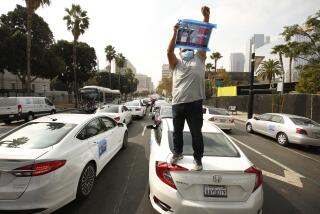Glendale Defends Drug Test Policy
- Share via
Attorneys for the city of Glendale and the American Civil Liberties Union clashed before the state Supreme Court on Wednesday in a case that could lead to a ban on California cities testing most employees for drugs.
Since 1986, Glendale has required all new employees and candidates for promotion to pass a urine test for illegal drugs.
Glendale officials have asked the Supreme Court to overturn a 1994 appellate court ruling that struck down the city’s right to conduct the tests for about half the city’s roughly 450 job categories.
That ruling--made after the ACLU appealed a lower court decision mostly upholding the city’s policy--allowed Glendale to continue testing only police, firefighters, drivers and other jobs that involve public safety. But city officials contend that they should have the right to conduct drug tests for all jobs, as private employers have.
Ron Braden, chief assistant Glendale city attorney, said because the case is under appeal, the city is not bound by the earlier rulings and drug testing is now taking place. But he said the city’s goal is to get the court to reinstate the policy for all municipal workers.
“This is a test case,” he said. “This not only has implications for other cities, but all governments in the state [and] all private employers. Whatever the court sets as the standard will be the law.”
The Supreme Court’s ruling is due within 90 days, court officials said.
Braden said the courts have created a “double standard” for the private and public sectors. Glendale’s policy is “not nearly as stringent” as some drug-testing procedures by private companies and professional sports organizations that have been upheld by the courts, he said.
“I think random drug testing, without notice or warning . . . that’s far more stringent,” Braden said outside the courtroom. But, he said, “in this case, people know they’re going to be tested, and they have chosen to apply. If they don’t want to be tested they don’t have to apply.”
Braden contended that the city has a responsibility to ensure that employees on the public payroll are not drug users. He cited a city survey conducted in 1986--when Glendale’s drug-testing program began--indicating that more than 20% of city job applicants tested positive for illegal drug use.
Hiring drug users could result in about $1.8 million per year in costs to the city due to lost productivity, accidents, lost work time and increased medical benefits, Braden told the court.
But Marvin Krakow, an attorney for the ACLU, urged the court to uphold the lower court’s restrictions on Glendale’s policy. He called the policy an “abuse of power” that violates employees’ constitutional rights to privacy and freedom from unreasonable searches and seizures, as well as the Confidentiality of Medical Information Act.
“There’s nothing wrong with any employer wanting to hire the best people possible [or] with believing that someone who uses drugs may not be a good employee,” Krakow said.
“What’s wrong is when employers believe that in order to satisfy that concern, they can take the lives of the people that work for them and open them up on the table. That is an outrage.”
The ACLU contends that urinalysis not only detects the use of illegal drugs, but also indicates whether the person is using medications that would divulge information about that person’s private life--such as the AIDS drug AZT, insulin or birth control pills.
One year after it went into effect, the city’s policy was challenged in Superior Court by Lorraine Loder, a Glendale resident and attorney, with the support of the ACLU. Although Loder never sought city employment, she was allowed to press the case as a taxpayer.
In 1992, a Superior Court judge ruled the policy violates individuals’ constitutional right to privacy, and ordered the city to cease testing for all but about 20% of jobs, predominantly those affecting public safety or involving the handling of large amounts of money. Both the city and ACLU appealed the ruling, resulting in the 1994 appellate ruling that banned testing for about 50% of all city job classifications.
More to Read
Sign up for Essential California
The most important California stories and recommendations in your inbox every morning.
You may occasionally receive promotional content from the Los Angeles Times.













